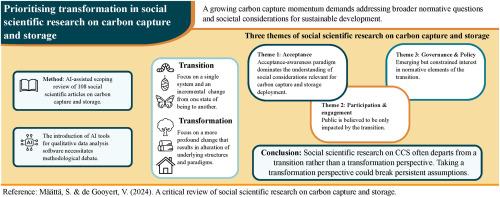A critical review of social scientific research on carbon capture and storage
IF 16.3
1区 工程技术
Q1 ENERGY & FUELS
引用次数: 0
Abstract
Carbon capture and storage technologies have become a prominent discussion point within the broader portfolio of mitigation options to limit climate warming to well below 2 °C. Most carbon capture and storage research has focused on technical and economic aspects. However, there is a growing recognition of the systemic nature of sustainability transitions and the importance of diverse societal considerations. Despite this emerging focus, the research field is constrained by persistent assumptions.
This critical scoping review of social scientific research on carbon capture and storage analysed 108 research articles. Using a combination of manual and artificial intelligence coding, the analysis focused on identifying social variables. The review identified three key themes: acceptance, engagement and participation, and governance and policy.
Social scientific research on carbon capture and storage has been dominated by an acceptance-awareness paradigm and a tendency to view the public solely as actors impacted by the transition. Normative questions have received limited attention, though new interest is emerging. These paradigms and identified research gaps suggest that the field has adopted a transition perspective rather than a transformation perspective. By discussing the differences between these perspectives, this review provides a novel understanding of the research field, which can support socially sustainable development as carbon capture and storage momentum grows. Additionally, the review explores the advantages and challenges of employing artificial intelligence tools in qualitative social sciences.

对碳捕集与封存社会科学研究的批判性评述
碳捕集与封存技术已成为将气候变暖限制在远低于 2 °C 的更广泛减缓方案组合中的一个突出讨论点。大多数碳捕集与封存研究都集中在技术和经济方面。然而,人们越来越认识到可持续性转型的系统性以及各种社会因素的重要性。尽管出现了这种新的关注点,但研究领域仍受到持续存在的假设的限制。这项关于碳捕集与封存社会科学研究的重要范围界定综述分析了 108 篇研究文章。采用人工和人工智能编码相结合的方法,分析的重点是确定社会变量。关于碳捕集与封存的社会科学研究一直以接受-认知范式为主导,并倾向于将公众仅仅视为受转型影响的行动者。规范问题受到的关注有限,尽管新的兴趣正在出现。这些范式和已发现的研究空白表明,该领域采用的是过渡视角,而非转型视角。通过讨论这些视角之间的差异,本综述为研究领域提供了一种新的理解,随着碳捕集与封存势头的增长,这种理解可以为社会可持续发展提供支持。此外,本综述还探讨了在定性社会科学中使用人工智能工具的优势和挑战。
本文章由计算机程序翻译,如有差异,请以英文原文为准。
求助全文
约1分钟内获得全文
求助全文
来源期刊

Renewable and Sustainable Energy Reviews
工程技术-能源与燃料
CiteScore
31.20
自引率
5.70%
发文量
1055
审稿时长
62 days
期刊介绍:
The mission of Renewable and Sustainable Energy Reviews is to disseminate the most compelling and pertinent critical insights in renewable and sustainable energy, fostering collaboration among the research community, private sector, and policy and decision makers. The journal aims to exchange challenges, solutions, innovative concepts, and technologies, contributing to sustainable development, the transition to a low-carbon future, and the attainment of emissions targets outlined by the United Nations Framework Convention on Climate Change.
Renewable and Sustainable Energy Reviews publishes a diverse range of content, including review papers, original research, case studies, and analyses of new technologies, all featuring a substantial review component such as critique, comparison, or analysis. Introducing a distinctive paper type, Expert Insights, the journal presents commissioned mini-reviews authored by field leaders, addressing topics of significant interest. Case studies undergo consideration only if they showcase the work's applicability to other regions or contribute valuable insights to the broader field of renewable and sustainable energy. Notably, a bibliographic or literature review lacking critical analysis is deemed unsuitable for publication.
 求助内容:
求助内容: 应助结果提醒方式:
应助结果提醒方式:


